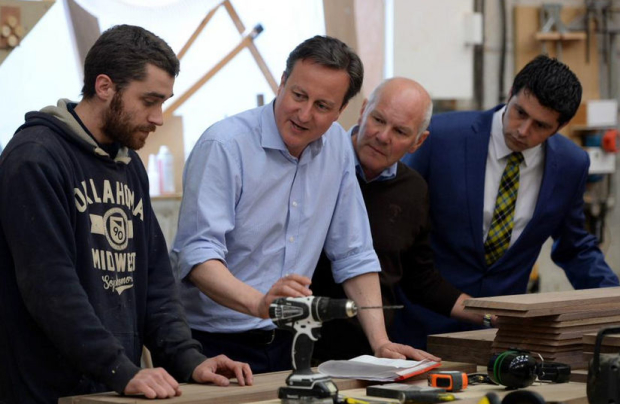Editor's Blog: Why won't party leaders discuss the arts?
‘The culture sector has been left feeling like an undervalued child’

© Twitter @David_Cameron
Why aren't party leaders keen to discuss arts and culture alongside issues of education, health and the economy, which are debated with grinding regularity? Amid campaign catchphrases such as "long term economic plan" and "x days to save the NHS", it would have been nice to hear "putting our country's culture first".
Industry newspaper The Stage should be commended for speaking to the culture ministers of seven parties about their plans; it was interesting to see Tory Ed Vaizey use the phrase "obviously we take the arts very seriously", before refusing to make promises to protect arts funding, and that UKIP's Peter Whittle recently saw My Night With Reg.
But we have yet to see this debate enter the mainstream. Yes, I get that issues such as Europe and the NHS are higher up the pecking order of national debate. However, it strikes me as a missed opportunity that no-one has loudly made the case that a healthy culture can help heal a fractured country. Even the Greens, whose policies on the arts are the most progressive, have been relatively muted about them, preferring instead to focus their rhetoric around more well-trodden issues.
And it's not just the rhetoric. On the campaign trail we see no end of photos of Cameron, Miliband, Clegg et al pretending to do manual labour in factories, or dining in greasy spoon cafes. But why don't we see them in theatres, museums and libraries? Why are they so scared to show their faces in our world-beating cultural institutions?
'The UK's creative industries are worth £76.9 billion to the economy'
Whatever the outcome on Friday, I hope they will look back and rue the opportunity they missed by failing to shine a spotlight on an overlooked British industry that is, as has been proven time and time again, one of the greatest exports this country has.
Let's not forget that DCMS figures recently said the UK's creative industries are worth £76.9 billion to the economy. They also account for 5.6 percent of total UK jobs. Surely this makes them worthy of at least one question during a TV leaders' debate, or a token visit on the campaign trail?
Instead, the culture sector has been left once again feeling like an undervalued child. It gets brought out for entertainment when guests come to visit; if there's an opening ceremony of the Olympic Games to organise, say. But otherwise it's asked to leave the room when serious family matters are being discussed.
So let's keep shouting about its successes and pressuring those politicians to listen, so that maybe one day the culture sector will garner the attention it so richly deserves.













